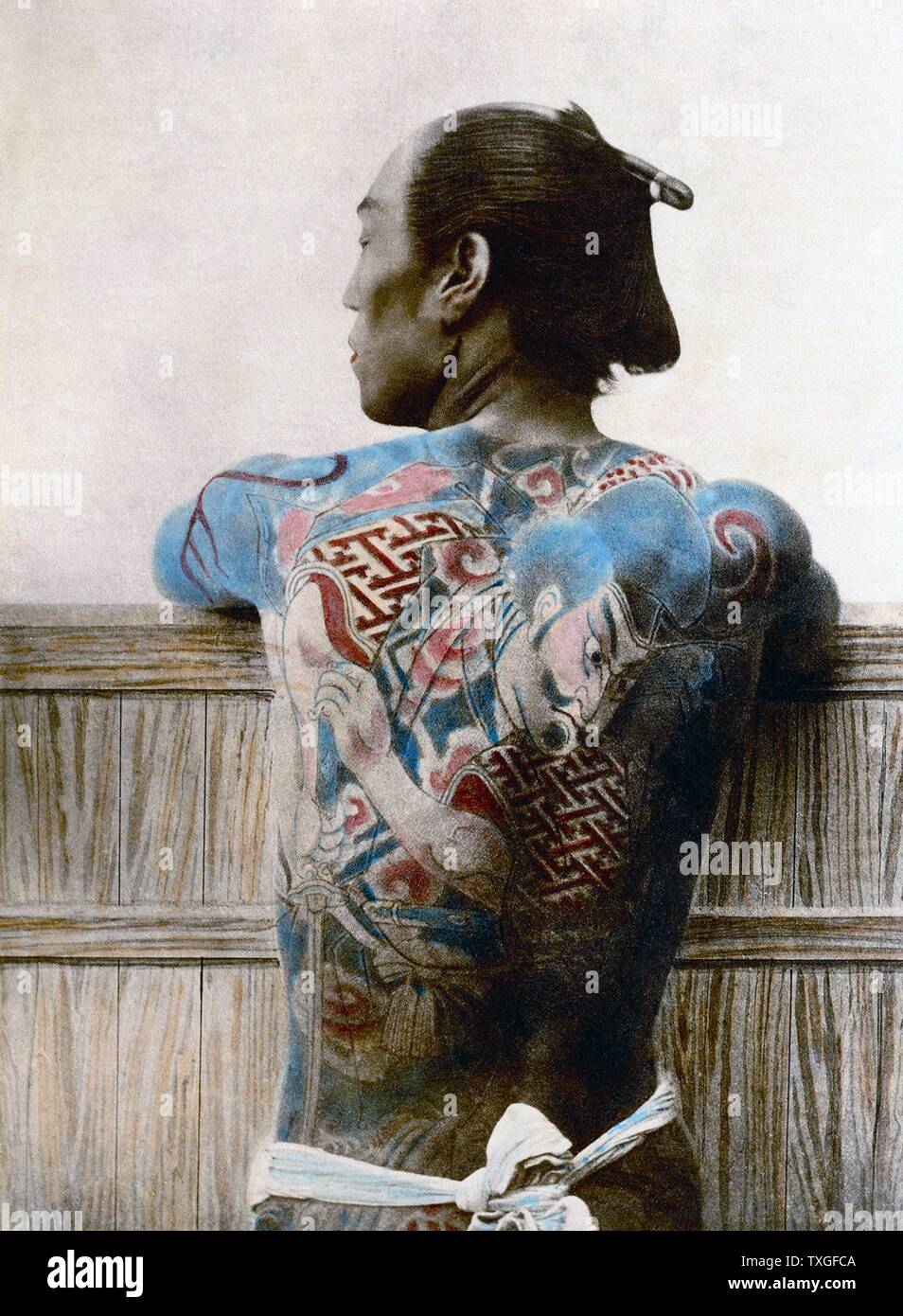Last Updated on June 18, 2025
Samurai did have tattoos, as tattoos served as indications of their status, accomplishments, and allegiance. However, the samurai viewed tattooing as a barbaric practice and considered themselves too dignified to be tattooed.
Common people, on the other hand, used tattoos to show their bravery.

Credit: en.wikipedia.org
Overview Of Samurai Tattoos
Samurai tattoos have long been a subject of intrigue for history enthusiasts and tattoo enthusiasts alike. These tattoos, known as Irezumi in Japanese culture, hold a significant historical and cultural significance. Contrary to popular belief, not all samurai had tattoos. In fact, tattooing was more prevalent among the common people as a symbol of bravery and a way to exhibit their warrior spirit. In this article, we will delve into the historical perspective, cultural significance, and controversy surrounding samurai tattoos.
Historical Perspective
In feudal Japan, during the Edo period, tattooing was a common practice among the commoners. However, samurai viewed tattooing as a barbaric act and believed it went against their dignified status. While they were not completely against tattoos, they rarely sported them on their bodies. Instead, samurai used other means to display their bravery and warrior status through weaponry and armor. On the other hand, tattoos were often seen as a punishment for criminals and eventually became associated with the criminal class. This historical perspective sheds light on the limited presence of tattoos among samurai.
Cultural Significance
In Japanese culture, tattoos hold deep cultural significance. Irezumi, or traditional Japanese tattoos, are known for their intricate designs and symbolism. Samurai tattoos, in particular, symbolize nobility and honor. The samurai, infamous for their warrior skills, embodied traits such as loyalty, bravery, and discipline. People who choose samurai tattoos often identify with these qualities and seek to embody the spirit of the samurai in their own lives, facing challenges with courage and determination.
Controversy And Misconception
There is often a misconception that all samurai had tattoos. However, as mentioned earlier, tattooing was not a common practice among samurai. This misconception may stem from depictions in popular culture, such as movies and literature, that romanticize the idea of tattooed samurai. Another controversy surrounding samurai tattoos is the association with the Yakuza, a Japanese gang known for their full-body tattoos. While tattoos are not illegal in Japan, they are often stigmatized and associated with criminal behavior. This cultural perception adds to the controversy surrounding samurai tattoos in modern times.
Overall, samurai tattoos offer a fascinating glimpse into Japanese history and culture. While not all samurai had tattoos, the ones that do exist symbolize the noble qualities and warrior spirit associated with the samurai class. Understanding the historical perspective, cultural significance, and controversies surrounding samurai tattoos helps us appreciate the complex and evolving nature of tattoo art in Japan.

Credit: www.way-of-the-samurai.com
Samurai Tattoos In History
Samurai tattoos are an intriguing aspect of Japanese history. Though often associated with the yakuza, these tattoos have a deeper meaning and cultural significance that dates back centuries. Let’s explore the origins and evolution, symbolism and meanings, and the role they played in samurai culture.
Origins And Evolution
The practice of tattooing, known as irezumi in Japanese, has a long history in Japan. It is believed to have originated in the Jomon period, between 10,000 BCE and 300 BCE, with evidence of tattoos found on clay figurines. Initially, tattoos were used as a form of identification for criminals and slaves.
However, during the Edo period (1603-1868), tattoos gained popularity among the common people who used them to display their bravery and express their individuality. The art of tattooing also evolved, with advancements in needle technology and improved ink quality.
Symbolism And Meanings
Samurai tattoos are rich in symbolism and hold various meanings. They often depict elements associated with their warrior status, such as swords, dragons, cherry blossoms, and koi fish. These symbols represent nobility, strength, resilience, and the pursuit of excellence.
Warriors in ancient Japan were highly respected, and their tattoos served as a visual representation of their honor, loyalty, and skill. The designs would often vary based on the individual’s achievements and accomplishments, highlighting their unique journey.
Role In Samurai Culture
Tattoos played a significant role in samurai culture, although not all samurai had tattoos. While the samurai viewed tattooing as a barbaric practice and too undignified for their status, common people embraced it as a way to showcase their warrior spirit.
For the commoners, tattoos served as a form of empowerment and a means to express their bravery and defiance against societal norms. It allowed them to embody the warrior ethos and symbolize their readiness to face challenges and protect their loved ones.
Despite their cultural significance, the popularity of samurai tattoos declined during the Meiji era (1868-1912) due to government bans and modernization efforts that aimed to erase traditional customs. However, the legacy and symbolism of these tattoos continue to captivate people’s imagination and inspire modern tattoo artists.
Cultural Significance Of Samurai Tattoos
Samurai tattoos hold a deep cultural significance in Japan and are a vibrant expression of the samurai’s identity and values. In this section, we will explore the various aspects that make these tattoos meaningful and revered.
Nobility And Warrior Spirit
The samurai were not only known for their elite fighting skills, but also for their noble status in Japanese society. These tattoos symbolize the nobility and honor that the samurai possessed, serving as a reminder of their extraordinary position in the warrior caste.
Samurai tattoos also reflect the warrior spirit embodied by these elite fighters. They were fearless in the face of adversity and displayed unwavering courage on the battlefield. These tattoos convey the essence of bravery and tenacity, inspiring individuals to emulate their warrior ethos in their own lives.
Status And Significance
Samurai tattoos were reserved for those of the samurai class, serving as a visible sign of their social status and prestige. These intricate designs were a mark of distinction, setting them apart from commoners. The larger and more elaborate the tattoo, the higher the rank and standing of the samurai.
Moreover, these tattoos were often seen as a form of protection. It was believed that these sacred symbols would provide spiritual and physical defense during battle, increasing the samurai’s chances of victory. By adorning their bodies with these tattoos, samurai sought to showcase their dedication to their craft and the honor-bound code of Bushido.
Expression Of Bravery
Samurai tattoos were a visual representation of the samurai’s bravery and resilience. These designs often incorporated elements such as fierce animals like dragons and tigers, or mythical creatures like phoenixes, which symbolize strength, wisdom, and rebirth.
Through these tattoos, samurai would proudly exhibit their commitment to protect their masters, their clan, and their nation. The artistry and symbolism of these tattoos exude an aura of fearlessness, serving as a constant reminder of the samurai’s unwavering allegiance and dedication to their cause.
Samurai tattoos have a deep cultural significance that goes beyond mere body art. These tattoos encompass the nobility, warrior spirit, status, and bravery of the samurai. They serve as timeless reminders of a rich historical heritage and inspire individuals to embrace these values in their own lives.

Credit: www.alamy.com
Controversies And Misconceptions
When it comes to the topic of samurai tattoos, there are many controversies and misconceptions surrounding this ancient practice. Let’s explore some of the most prevalent misconceptions and shed light on the truth behind them.
Prohibition And Attempts To Ban Tattoos
Contrary to popular belief, tattoos were not always prohibited among samurai. During the Edo period, tattooing, known as horimono, was a common practice among the common people. However, the samurai considered themselves too dignified to be tattooed and viewed it as a barbaric practice. It is believed that only the lower-class individuals resorted to tattoos to showcase their bravery since they were unable to perform samurai rituals like seppuku.
Despite the view of samurai towards tattooing, there were attempts made to ban tattoos during the Edo period. The prohibition was aimed at controlling the spread of criminal organizations and their association with tattoos. However, it is important to note that this ban targeted not just samurai but also the general population.
Association With Criminals And Yakuza
One of the biggest misconceptions surrounding samurai tattoos is the association with criminals, particularly the yakuza. While it is true that the yakuza often sport extensive tattoos that cover their entire bodies, this association does not directly translate to samurai tattoos.
The yakuza’s tradition of tattooing, known as irezumi, developed separately from the samurai culture. The yakuza tattoos often depict elaborate designs and symbols, serving as a form of initiation and indication of commitment to the criminal organization. These tattoos are unique to the yakuza and should not be confused with traditional samurai tattoos.
Modern Perspectives And Regulations
In modern Japan, tattoos continue to carry certain stigmas. While they are not illegal, they are often associated with the yakuza and can be perceived negatively in certain contexts. Many public places, such as bathhouses and traditional hot springs, may still have policies restricting entry for individuals with visible tattoos.
However, it is essential to acknowledge that attitudes towards tattoos are evolving. The younger generation in Japan is increasingly embracing tattoos as a form of self-expression and art. There is also a growing acceptance of tattoos in the sports and entertainment industry.
To navigate these changing perspectives, it is recommended for individuals with tattoos to be mindful of cultural norms and regulations while visiting Japan. Covering tattoos when in public spaces that prohibit them can help avoid any misunderstandings or discomfort.
Overall, while samurai did not commonly have tattoos, the association between samurai and tattoos has been subject to much speculation and misunderstanding. By unraveling these controversies and misconceptions, we gain a clearer understanding of the true role of tattoos in samurai culture.
Frequently Asked Questions On Did Samurai Have Tattoos?
Did Ancient Japanese Have Tattoos?
Yes, some ancient Japanese, including samurai, had tattoos. Tattooing was seen as a practice of bravery and a way to show their status and accomplishments. However, the samurai themselves did not typically get tattoos as they considered it to be beneath their dignity.
Did Samurai Tattoo Themselves?
Samurai did not tattoo themselves because they considered it a barbaric practice and believed it was beneath their dignity. However, common people who couldn’t perform samurai rituals used tattoos to display their bravery.
What Does A Samurai Tattoo Represent?
Samurai tattoos represent nobility, warrior spirit, and bravery. However, historically, samurai viewed tattooing as a barbaric practice and considered themselves too dignified to be tattooed. Common people used tattoos to show their bravery. Samurai tattoos can symbolize the status and skill of warriors.
Are Tattoos Against Japanese Culture?
Tattoos are not against Japanese culture, but they are often associated with the Yakuza, a Japanese gang. The Japanese government does not consider tattoos as an art form.
Did Samurai In Ancient Japan Have Tattoos?
Yes, samurai in ancient Japan did have tattoos. However, they viewed tattooing as a barbaric practice and considered themselves too dignified to be tattooed. Common people used tattoos to show bravery.
Conclusion
Samurai, known for their honor and dignity, viewed tattooing as a barbaric practice and did not have tattoos themselves. Tattoos were associated with criminals and were eventually linked to organized crime in Japan. While some samurai may have gotten tattoos, it was not a common practice among them.
Instead, tattoos were often used by common people to demonstrate their bravery. So, the idea that all samurai had tattoos is a misconception.


